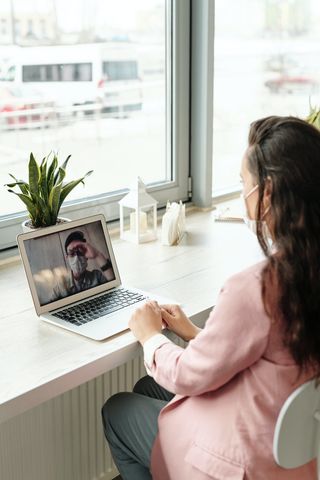Health
Three Tips for Mental Health During COVID-19 and Zoom
While the ability to connect online may seem like a good thing, there is a cost.
Posted April 15, 2020 Reviewed by Gary Drevitch
Social distancing has kept us physically separated. At the same time, technology has led to more connection than ever. Texts, emails, video chats, tweets, and live news conferences are at an all-time high. Total internet hits have surged by up to 70%, and streaming has jumped by at least 30% worldwide. While the ability to connect online may seem like a good thing, there is a potential cost: Our relationship with technology may be negatively affecting our mental, emotional, and physical well-being.
We have entered another stage in the COVID-19 pandemic. The impact on mental and emotional well-being is significant. Anxiety, fear, and depression have escalated as people continue to become ill and experience isolation, unemployment, financial insecurity, and other hardships. Many feel a loss of control and a sense of uncertainty about when they will be able to resume their normal lives.
During times of stress and trauma, people turn to various methods of coping in order to alleviate negative feelings. Researchers have studied the different ways people cope and have pinpointed helpful and unhelpful approaches.
Adaptive coping enhances our mental health and well-being through active attempts to establish a sense of control in challenging situations. Adaptive strategies may include reaching out to others as a way to manage negative feelings. Practicing relaxation or meditation and exercising are also forms of adaptive coping. Research indicates that activities such as yoga, dance, and meditative practice directly influence nervous system pathways and subsequently produce anti-stress properties, reducing the physiological and psychological damage of loneliness and isolation. These types of activities decrease the stress hormone cortisol and boost your immune system. Such practices increase joy and relaxation and provide your body and mind with a much-needed break. Moreover, many of these practices are best conducted in a group setting which pushes you to engage even when you may feel like giving up, and encourages a sense of community. Online learning is also adaptive because it facilitates a sense of purpose and meaning which is fundamentally beneficial to coping with crisis and trauma. The ability to connect with others in real time, learn or brush up on a skill, and video chat with friends and family are all available both in synchronous and asynchronous formats through a variety of technology-related mediums. Just last week, I was singing and dancing in my living room with 67 other people via a live Zoom event.
On the other hand, maladaptive coping is associated with increased anxiety and depression. Maladaptive coping may involve ruminating over stressful situations and staying stuck in negative thought patterns. Constantly worrying about whether you will get sick, whether you have taken all necessary precautions, whether you sterilized your packages the right way, and how long this pandemic will last fuels obsessive thinking and consequently exacerbates feelings of stress and helplessness. Avoidance of reality, such as insisting that there is no potential health crisis and engaging in high-risk behaviors by not following social distancing, hand washing, and other best practices is also maladaptive.
You may find yourself numbing or distracting yourself with technology. If this becomes a habit, you may become stuck in a vicious cycle of unhealthy behavior and emotional distress. Such behavior includes binge-watching television shows and incessantly watching and reading news focused on the COVID-19 pandemic. These activities perpetuate anxiety and depression. Another form of compulsive behavior that has surged during this time is online shopping, especially for items that you may not even need. Moreover, staying up late to engage in these online behaviors doesn’t allow the body to fully rest and recover, both crucial to well-being, especially in the face of a crisis.

Technology is not inherently good or bad; healthy or unhealthy. Rather, it is the way in which we use it that makes a difference in how we think, act, and feel. In other words, what we choose to view and engage with, how often we engage, and our intention impacts how we function.
As this pandemic continues to take its toll on so many aspects of our lives, and our reliance on cyber grows, consider your relationship with technology. The following questions may be helpful:
- Do I rely on the internet to relieve negative moods?
- Am I using technology to numb myself or avoid reality?
- Is my internet use impacting my ability to sleep?
- Is my technology use impacting my ability to concentrate or focus on other activities?
- Am I finding it difficult to limit my internet use?
- Is my internet use causing me to feel further isolated or disconnected?
If you find yourself answering “yes” to some or all of these questions, here are some tips for healthier technology use and related well-being:
- Consider more adaptive uses of technology to help mitigate both short-term and long-term stress instead of increase it. Cultivate an intention to use technology with a greater sense of personal control over your engagement.
- Find ways to moderate your media consumption. It is important that we all stay informed and continue to educate ourselves about preventative and protective measures by accessing COVID-19-related information online. However, too many people become consumed with this information, leading to a downward spiral. They may find themselves obsessing and ruminating about sickness, contagion, and death. Instead of being tuned in all day, you may want to consider checking media outlets only once or twice a day, and not doing so right when you wake up or before bedtime.
- Consider ways to be a more discerning consumer of technology in terms of purpose, content, and frequency, with the goal of mental and emotional health. Examples may be reaching out to others online for support, and engaging in activities that promote a sense of purpose and meaning, as well as relaxation. Choose news sources that provide up to date and scientifically sound information based on the best available research.
Navigating this pandemic by understanding the ways in which technology can be a source of healing or stress is imperative to our well-being. Try to strike a balance and remember: We’re all coping as best we can.


